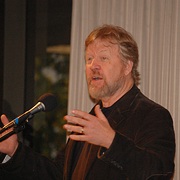Daniel L. Everett
Author of Don't Sleep, There Are Snakes: Life and Language in the Amazonian Jungle
About the Author
Daniel L. Everett is the Dean of Arts and Sciences at Bentley University in Waltham, Massachusetts. He is the author of many books, including Don't Sleep, There Are Snakes; Language: The Cultural Tool; and Linguistic Fieldwork: A Student Guide. His life and work is also the subject of a documentary show more film, The Grammar of Happiness. show less
Image credit: my photo
Works by Daniel L. Everett
Don't Sleep, There Are Snakes: Life and Language in the Amazonian Jungle (2008) 787 copies, 32 reviews
Wari' 2 copies
Don't Sleep There are Snakes 2 copies
Associated Works
Tagged
Common Knowledge
- Birthdate
- 1951-07-26
- Gender
- male
- Nationality
- USA
- Birthplace
- Holtville, California, USA
- Education
- University of Campinas (Brazil)
- Occupations
- linguist
- Organizations
- Bentley University (dean of arts and sciences)
University of Pittsburgh
Illinois State University
Members
Reviews
Lists
Awards
You May Also Like
Associated Authors
Statistics
- Works
- 14
- Also by
- 1
- Members
- 1,171
- Popularity
- #21,976
- Rating
- 3.7
- Reviews
- 40
- ISBNs
- 44
- Languages
- 8
- Favorited
- 1















